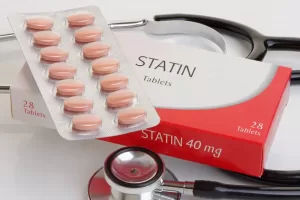High Cholesterol- when is it a problem?
We need cholesterol!
First of all, it’s important to understand that cholesterol itself is not bad. In fact, it’s essential for life! Cholesterol is a fatty substance which is used by the body in many vital processes:
- to build cell membranes
- to make bile acids, which digest food
- to make hormones (like oestrogen and testosterone)
- to allow the body produce Vitamin D
However, the body can make its own cholesterol- so you don’t need to get it from food sources. If you eat too much unhealthy fatty food, the cholesterol levels in your blood may increase and cause problems.
What are the different types of cholesterol?
- There are different forms of cholesterol. LDL cholesterol is sometimes known as “bad cholesterol” as it is linked to a higher risk of vascular disease, such as heart attack and stroke. This is because high LDL cholesterol (along with other risk factors such as smoking and high blood pressure) can lead to blockages in blood vessels.
- HDL cholesterol is also known as “good cholesterol” as it helps to transport cholesterol out of the bloodstream- higher levels of HDL cholesterol are associated with a lower risk of heart disease.
- If you have a blood test to check your cholesterol (also known as lipids), the results will usually include measurement of total cholesterol, LDL, HDL and triglycerides.
What causes high cholesterol?
There are a few factors:
- Genetics- high cholesterol tends to run in some families.
- Diet- certain foods can cause increases in LDL cholesterol
- fatty or processed meats
- biscuits, cakes & pastries
- snack foods like chips
- deep-fried foods
- many types of takeaway foods
- eggs and dairy foods in excessive amounts may be problematic for cholesterol, but many experts now advise that eggs and dairy eaten in moderation can benefit health in a variety of ways, and should not be eliminated altogether.
What are normal cholesterol levels?
- Total cholesterol and LDL cholesterol (sometimes known as “bad cholesterol) tend to be the focus of discussion when blood tests are done.
- Normal total cholesterol is less than 5mmol/L
- Normal LDL is less then 3mmol/L, but basically, the lower the better.
- However, in people who have other risk factors (for example, diabetes), the ideal or target levels for total and LDL cholesterol are lower.
- HDL cholesterol should ideally be above 1.6mmol/L
What age should you start having your cholesterol checked at?
- Australian guidelines state that it’s advisable to have a blood test to check your lipid (cholesterol) profile every 5 years, from the age of 45.
- Torres Strait Islanders and Aboriginal peoples should be tested every 5 years from the age of 35, as they have a higher risk of cardiovascular disease.
- How often you get retested after that depends on your results, and your other risk factors for cardiovascular disease.

When should cholesterol be treated with medication?
- The decision to start a medication depends on a person’s overall risk of heart disease and stroke (cardiovascular disease)- it’s different for different people.
- A cardiovascular risk calculator can be used to figure out your risk of getting a heart attack or stroke in the next 10 years, based on your cholesterol results and other risk factors- this can help your doctor to decide if you’re low, moderate or high risk.:
- Low risk: If risk is low (less than 10% risk of heart attack or stroke in the next 10 years), then it’s reasonable to try lifestyle changes (see below) and retest in 5 years
- Moderate risk: If risk is moderate (10-15% risk of heart attack or stroke in the next 10 years), then lifestyle changes can be tried at first- if there is no significant improvement in cholesterol levels after 6 months of healthy lifestyle changes, medication may be considered. However, a decision may be made to go straight for medication if a person is in a high-risk group- for example if they are of South Asian, Pacific Islander, Maori, Middle Eastern, Aboriginal or Torres Strait Islander descent, or if they’ve a strong family history of heart attack or stroke in younger people. Lipids (cholesterol) blood tests should be repeated every 2 years in this group.
- High risk: If risk is high (over 15% risk of heart attack or stroke in the next 10 years), then both lifestyle changes AND medication should be considered. A lipid profile (cholesterol) blood test should be repeated every year.
- However, it’s important to note that some people are “high risk” purely because they have certain health issues, and may be advised to start cholesterol-lowering medication on this basis- for example if they have significant chronic kidney disease, complications from diabetes, high blood pressure (above 180mmHg systolic), familial hypercholesterolaemia, or total cholesterol above 7.5mmol.
What are the recommended lifestyle changes if you have high cholesterol?
Lifestyle changes are aimed at reducing all risk factors that contribute to cardiovascular disease, and include the following:
- Quit smoking. Smoking allows LDL cholesterol to enter blood vessel walls more easily and cause damage.
- Healthy eating
- Increase exercise. Regular exercise appears to increase HDL levels while reducing LDL and triglycerides.
- Ensure blood pressure is normal
- Maintain a healthy body weight
- Look after your mental health- people who have depression or who are socially isolated may have a higher risk of cardiovascular disease- speak to your GP if you think this applies to you.
- If you have diabetes, ensure that your blood glucose control is good, and attend your doctor for regular check ups.
What foods should be avoided if you have high cholesterol?
- The key is to avoid unhealthy “trans fats” and saturated fats (check food labels for these) as they will push up LDL. It’s also important to source “good fats”, for example plant-based sterols. Cholesterol itself is present in foods but is not as harmful as trans and saturated fats.
- In the past, eggs were demonised as being high in cholesterol, but it’s now been shown that eggs are very nutritious and are not a major problem if you have high cholesterol, as they don’t affect LDL much. It’s OK for most people to have up to 6 eggs per week.
Foods that may lower cholesterol levels
LDL cholesterol may be lowered by certain foods:
- Polyunsaturated oils (e.g. sunflower oil and safflower oil).
- Oats
- Legumes
- Saponins- present in chickpeas and alfalfa sprouts
- Allicin- present in garlic and onions
- Plant sterols in cereals, fruit and vegetables
- Margarine and dairy products enriched with plant sterols
For more detailed information on lifestyle and dietary changes if you have high cholesterol, click here
If you have concerns about high cholesterol or cardiovascular disease, speak to your doctor.
Getting a Mental Health Care Plan in Australia: Your Guide
Getting a Mental Health Care Plan in Australia: Your Guide Mental health matters—and if you’re feeling overwhelmed, anxious, or down, a mental health care plan can help. But what is it, and how do [...]
UTI Symptoms and Treatment: What You Need to Know
UTI Symptoms and Treatment: What You Need to Know Urinary Tract Infections (UTIs) are common, uncomfortable, and often disruptive. But what exactly are the signs to watch for, and how can you get relief [...]
Free Mental Health Care Plan Online | Bulk-Billed by Qoctor
Free Mental Health Care Plan Online | Bulk-Billed by Qoctor Discover how to get a free, bulk-billed Mental Health Care Plan (MHCP) in Australia through Qoctor's telehealth service. Accessing [...]




